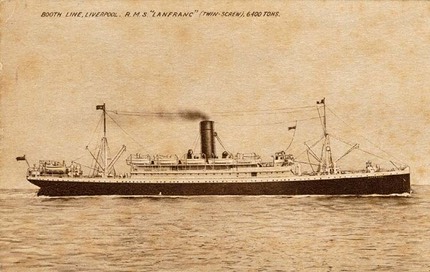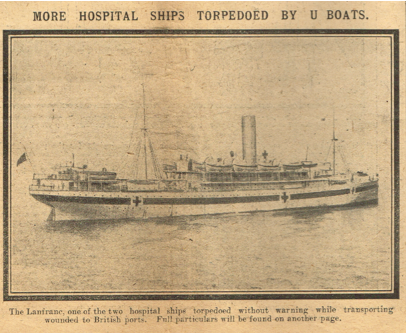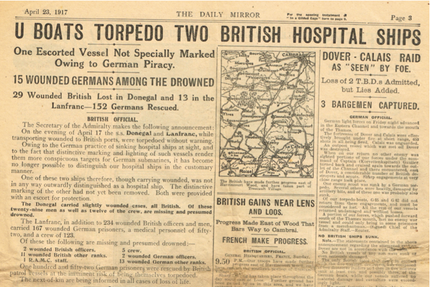John Alfred (Jack) Stafford (born 1879) served in the 5th Infantry Labour Company of the Royal Devonshire Regiment, and the Labour Corps. He was wounded in March 1917 and sent home on 18 March.
According to his family Jack was sent across the channel on the Lanfranc hospital ship which was sunk by a u-boat on 17 April 1917, 42 miles north of Le Havre. After being in the water for some time Jack had his right arm amputated and was for some time in hospital in Brighton.

HMS Hospital Ship 'Lanfranc'
Mediterranean Expeditionary Force
War Diary
SOUTHAMPTON 16 March 1917 Arrived and anchored off Netley at 5.30pm. Proceeded alongside quay at 9.45am. Commenced disembarking at 10am, finished at 11.35am.
SOUTHAMPTON 17 March 1917 Hove anchor at 5.45am and proceeded to COWES ROADS and anchored at 7am.
COWES ROAD 18 March 1917 Sailed for HAVRE at 8pm.
HAVRE 19 March 1917 Anchored at Havre at 3.30am. Proceeded alongside quay at 8pm.
HAVRE 20 March 1917 Commenced embarking patients at 7am. Finished at 9.15am. Patients embarked - Officers Cot 18, Sit 7, Other ranks Cot 251, Sit 126. German Prisoner Cot 1.
Total on board 403.
Cast of and sailed for Southampton at 9.30am. Anchored off Netley at 6.30pm.
SOUTHAMPTON 21 March 1917 Proceeded alongside quay at 7am. Commenced disembarking at 10am. Finished at 11.45am.
HAVRE 22 March 1917 Anchored off Havre at 6.30am. Proceeded alongside quay at 6.45am
HAVRE 23 March 1917 Commenced embarking patients at 6pm. Finished at 7.20pm. Total patients embarked Officers Cot 2, Sit 6, Other tanks Cot 268, Sit 128, Grand total 404. Cast off and sailed for Southampton at 7.30pm.
SOUTHAMPTON 24 March 1917 Anchored off Netley at 4am. Proceeded alongside quay at 8am commenced disembarking at 10am. Finished at 11.45am. Sailed for Havre at 11pm.
HAVRE 25 March 1917 Arrived and anchored at Havre at 7am.
HAVRE 26 March 1917 Lying in outer harbour awaiting orders.
HAVRE 27 March 1917 ditto
HAVRE 28 March 1918 ditto
HAVRE 29 March 1918 Proceeded alongside quay at 10.45am. Commenced embarking at 12noon. Finished at 2pm. Recommenced embarking at 4.45pm finished at 5.45pm.
Patients embarked Officers Cot 1, Sit 3, Other Ranks Cot 358, Sit 84, German Prisoners - Officers Cot 1 Other Ranks Cot 251, Sit 48. Total on board 420.
Sailed for Southampton at 10.30pm.
SOUTHAMPTON 30 March 1917 Arrived Southampton at 7.20am and made fast alongside quay at 8.25am. Commnced.
SOUTHAMPTON 31 March 1917 Awaiting orders.
Signed J C Furness Major R A M C
OC Troops HM Hosp Ship 'Lanfranc'

Daily Mail, 23 April 1917

Article from the Daily Mail 23 April 1917 (page 3)
British Merchant Ships Sunk by U Boats 1914-18 War by A J Tennant (PRO lib 940.45)
During World War I over 2,500 British merchant ships and auxiliaries on Admirality service were sunk by enemy action - a total in excess of 8 million gross tons of shipping. Of these over 2000 ships were destroyed by U boats.
LANFRANC 6287 Great Britain 1907
17 April 1917 Torpedoed and sunk in the English Channel 42 miles N, 1/2 E from Le Havre in position 50.11N.12E by German submarine UB40 whilst on a voyage from Le Havre to Southampton carrying wounded troops.
Five lost.
Lost whilst on Government service employed as a Hospital Ship.
The Great War : The Merchant Navy Vol III - by Hurd (PRO lib 940.4)
Two days later the ambulance transports LANFRANC (6,287) & DONEGAL (1885 tons) when on passage from Havre to Southampton were torpedoed without warning between 7pm and 8pm. Ambulance transports were vessels fitted to carry invalids and wounded but though painted a distinct grey, they ran as ordinary troop transports and, as distinct from hospital ships, could claim no immunity from attack. They were exposed to the same risks from unrestricted submarine warfare as were the ordinary merchant vessels.
The Lanfranc (Master Mr W E Pointer) was carrying 234 wounded British officers and men and 167 personnel and crew. She was escorted by destroyer BADGER and the P37 when about half way across the channel, a terrible explosion took place on the port side abrest of the bulkhead between the engine room and No 3 hold. The engines were immediately stopped. The ship listed to port, settled rapidly by the stern, and then slowly came again into an upright position.
Three of her boats were smashed by the explosion, and the Marconi installation was rendered useless. Both escorts were within about a mile of her at the time, one on either bow, and while P37 closed the LANFRANC, the BADGER searched for the submarine.
As the Lanfranc was at the time of the explosion steaming 14 knots, it would have been dangerous to lower her boats at once. As soon, however, as she had lost sufficient way, one boat at a time was lowered on each side, eight boats getting away safely.
Unfortunately one boat on the starboard side sank stern firsst, and nearly all the occupants were thrown into the sea, but were picked up later by lifeboats from the BADGER or sailing trawlers. Both escorts had by this time come alongside, and at very great risk, owing to the condition of the LANFRANC and the high seas running, had been embarking the wounded passengers, both British and German.
The behaviour of the latter was in many cases deplorable. Numbers of them rushed the boats or jumped on board the escorts.
In contrast to this behaviour of the Germans, we have another story told by a British Officer on board -
“The behaviour of our own lads I shall never forget. Crippled as many of them were, they tried to stand at attention while the more serious cases were being looked after, and those who could lend a hand scurried below to help in saving friend or enemy. I have never seen so many individual illustrations of genuine chivalry and comradeship. One may I say had a leg severed and his head was heavily bandaged. He was lifting himself up the staircase by the hands, and was just as keen on summoning help for Fritz as on saving himself. He whistled to a mate to come and aid a German who was unable to move owing to internal injuries. Another Tommy limped painfully along with a German Officer on his arm and helped the latter to a boat. It is impossible to give adequate praise to the crew and staff. They were all heroes. They remained at their posts until the last of the wounded had been taken off and some of them took off articles of their clothing and threw them into the lifeboats for the benefit of those who were in need of warm covering. The same spirit manifested itself as we moved away from the scene of the outrage.”
Four British (5 German wounded) and Five members of the crew were drowned.